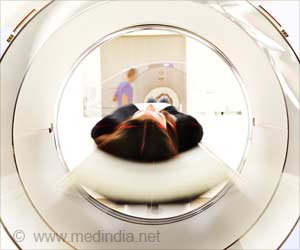A new wireless device can measure a person’s sleep postures accurately. It can be used to treat epilepsy, Parkinson’s disease, bedsores and sleep apnea.

‘A wireless device can accurately predict a person’s sleep postures using reflective radio signals. It can be used to treat epilepsy, Parkinson’s disease, bedsores and sleep apnea.’
Read More..




Various studies in that sleeping on the stomach can indicate a risk of sudden death in epilepsy patients. Sleep posture could also be used to measure the progression of Parkinson’s disease as the condition robs a person of the ability to turn over in bed. Read More..
In the future, BodyCompass can also be used by people to keep track of their sleep habits or to monitor infant sleeping. Thus, the device can be used as either a medical device or a consumer product.
Restful reflections
BodyCompass works by analyzing the reflection of radio signals as they bounce off objects in a room, including the human body.
A device similar to a Wi-Fi router sends and collects these signals from the bedroom wall as they return through multiple paths.
Advertisement
For the device to work, there should be a distinction between the sleeper’s body and surrounding objects in the bedroom. To solve this, the researchers used their previous work which can decipher breathing patterns from radio signals.
Advertisement
Reflections from the body are then analyzed by a customized neural network to infer how the body is angled in sleep.
The neural network defines sleep postures according to angles. Thus, the device can distinguish between a sleeper lying on the right side from one who has merely tilted slightly to the right.
This kind of fine-grained analysis would be especially important in epilepsy patients.
BodyCompass also has some advantages over other ways of monitoring sleep posture.
Installing sensors directly to the person could be uncomfortable and using a camera in the bedroom reduces a persons’ privacy.
As data is inferred from a person’s breathing signal, it is not possible to infer other activities of the user.
An accurate compass
The accuracy of the device was tested in over 200 hours of sleep data from 26 healthy participants.
At the beginning of the study, the participants wore two accelerometers that can detect motion. The accelerometers were taped to their chest and stomach, to train the device’s neural network with ‘ground truth’ data on the participant’s sleeping postures.
The researchers found that BodyCompass was most accurate by predicting the correct body posture 94%of the time when the device was trained on a week’s worth of data.
One night’s worth of training data yielded 87 % of accurate results. BodyCompass could also achieve 84 %accuracy with just 16 minutes’ worth of data when sleepers were asked to hold a few usual sleeping postures in front of the wireless sensor.
BodyCompass could prove useful in treating patients with epilepsy, Parkinson’s disease, bedsores and sleep apnea.
Currently, BodyCompass is a monitoring tool, but it may be paired someday with an alert that can prod sleepers to change their posture.
Future work may combine the sleep posture detector with a mattress that can move an epilepsy patient to a safer position if needed.
Source-Medindia














